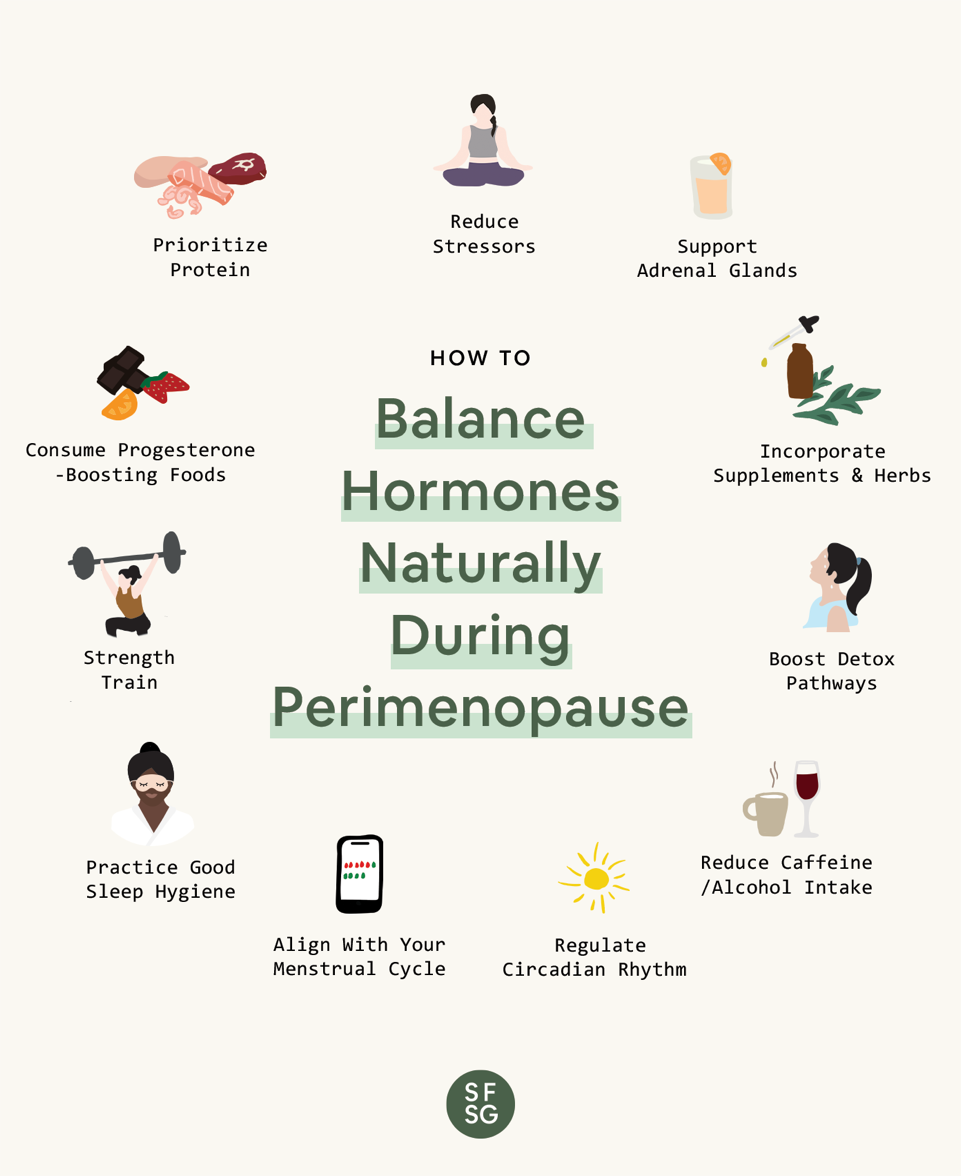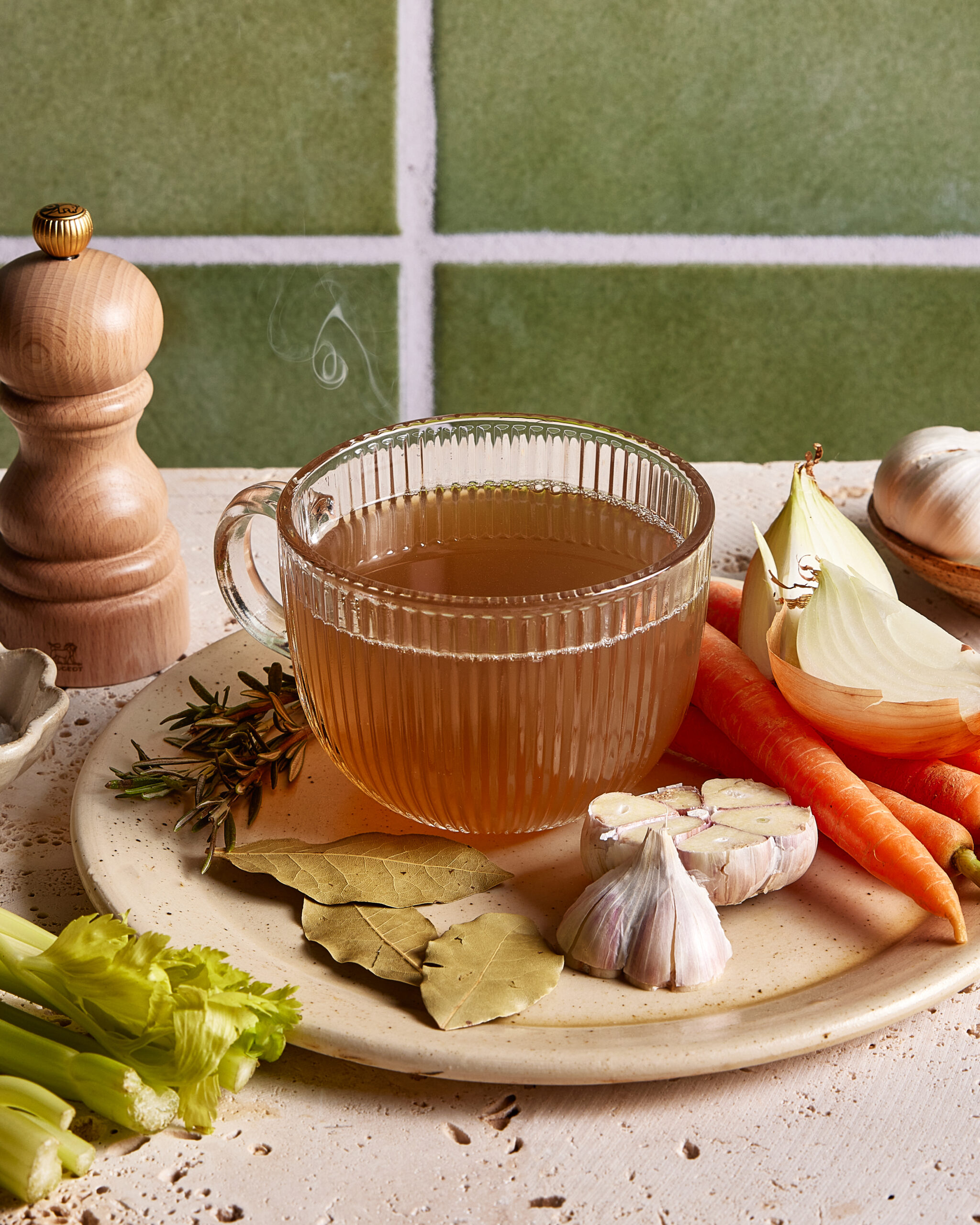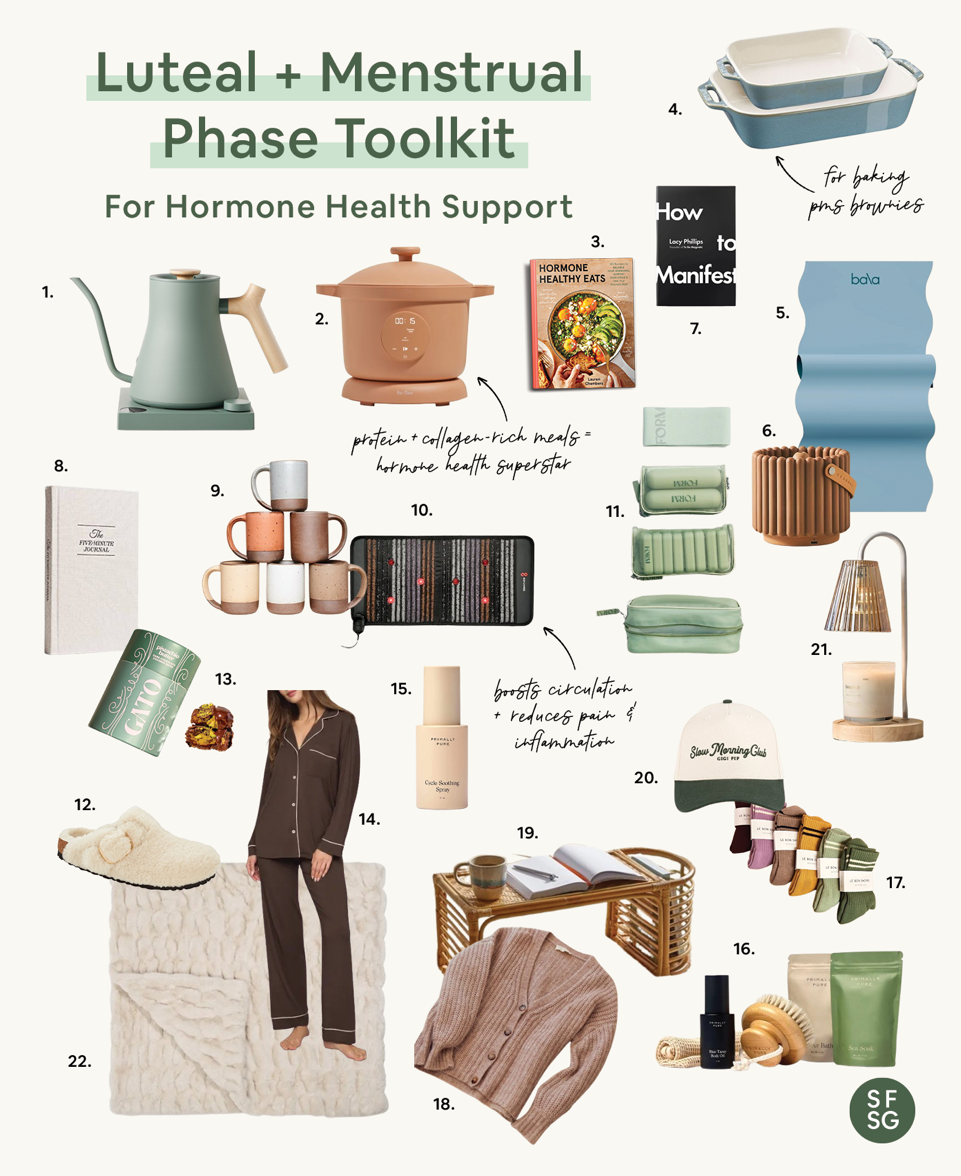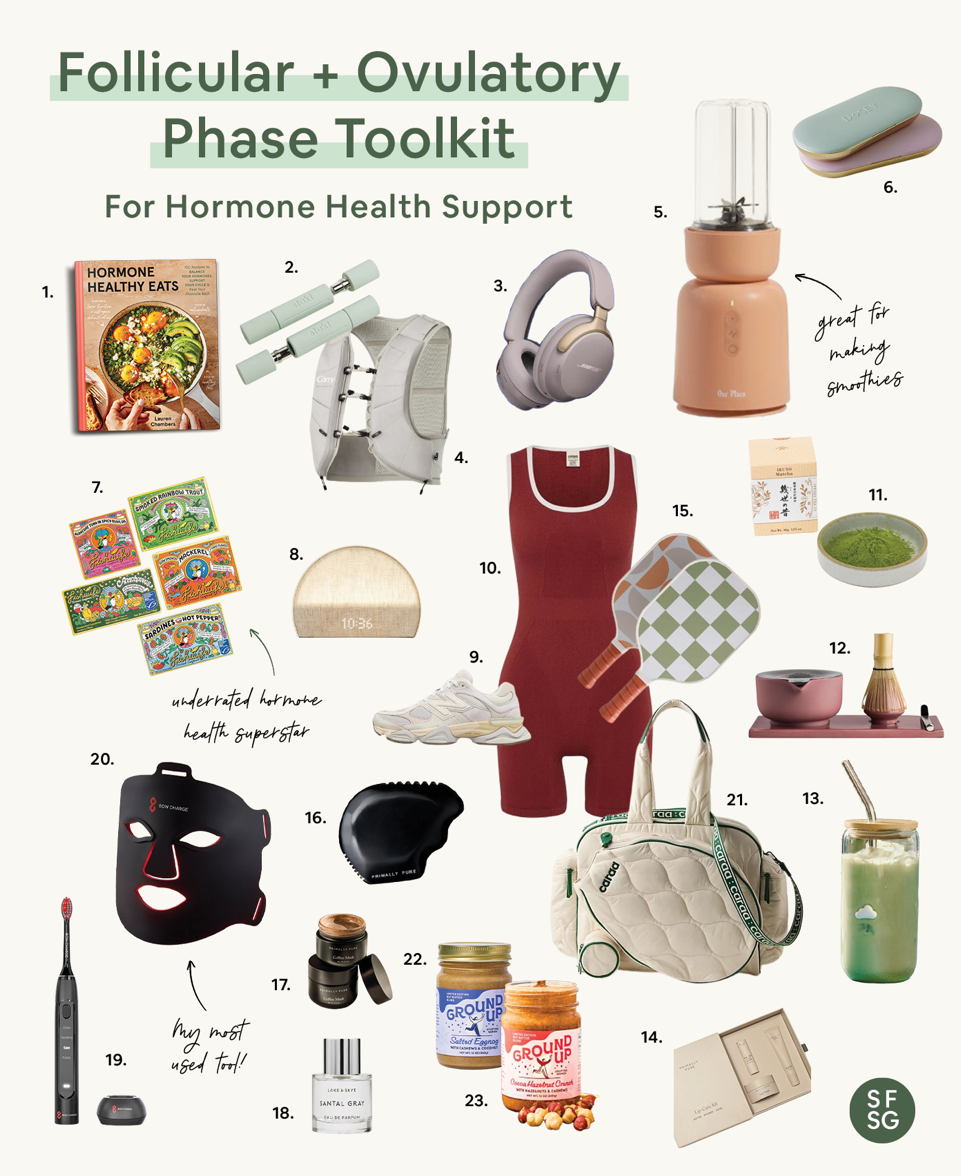recipes
lifestyle
wellness
motherhood
mindset
About
E-Books
Blog
Freebies
partnerships
hi, i'm lauren!
hey there!
I’m on a hot mission to help you balance your hormones & live your best life.
categories
Home
Quiz
Get In Touch
The Course
search:
Cookbook
Recipe key
GF
VG
P
Vegan
Gluten Free
Paleo
DF
Dairy-Free
download now
Join Hormone Healthy Eats!
Become a SFNSG insider to get my monthly Substack, Hormone Healthy Eats! Packed with the latest hormone-healthy recipes
+ tips.
jump to recipe >
Depending on your age and where you’re at on your hormone health journey, perimenopause may or may not be on your radar.
TBH for many years it was something I didn’t think I had to think about….but now, knowing everything I know as a nutrition and hormone health coach, I feel very passionate about educating women on the subject of perimenopause, and the earlier the better!
Because here’s the thing: how we care for ourselves and our hormones in our twenties and thirties has a HUGE impact on how we feel as we transition into perimenopause and eventually menopause.
And I don’t know about you, but I don’t want to dread this next chapter of my life. I want to continue to age gracefully and enjoy everything life has to offer, instead of dealing with uncomfortable or even debilitating symptoms.
That being said, if you are already struggling with perimenopause I want you to know it’s not too late! You still have so much power to reduce your symptoms and feel better almost immediately.
This post will provide you with plenty of simple yet impactful tips to help you support your hormones during this transition and feel as good as you possibly can. Snag all of the details below.
Need help balancing your hormones + reducing symptoms? Get on the waitlist for my online course, opening for enrollment soon!
WHAT IS PERIMENOPAUSE
Perimenopause refers to the period of time when your body starts making the natural transition to menopause, and the ovaries gradually produce less reproductive hormones such as estrogen and testosterone, ultimately marking the end of your menstrual cycle and reproductive years.
Perimenopause can occur anytime in your 30’s to 50’s, and typically lasts anywhere from 4-8 years. When your hormones are supported and healthy, this transition should be smooth, unfortunately most women experience a variety of uncomfortable symptoms that are heightened due to pre-existing hormonal imbalances and conditions.
SIGNS + SYMPTOMS OF PERIMENOPAUSE
Some of the most common signs and symptoms of perimenopause include:
-
+ Irregular Periods
-
+ Irregular Ovulation/Decreased Fertility
-
+ Spotting In Between Periods
-
+ Change in period length or flow
-
+ Hot Flashes
-
+ Night Sweats
-
+ Sleep Disturbances
-
+ Anxiety
-
+ Weight Gain
-
+ Decreased Libido
-
+ Mood Swings
-
+ Depression
-
+ Headaches/Migraines
-
+ Heart Palpitations
-
+ Vaginal Dryness
-
+ Fatigue
-
+ Urinary Urgency
-
+ Muscle/Joint Aches and Pains
-
+ Tender/Swollen Breasts
-
+ Fluid Retention
-
+ PMS-Like Symptoms
WHAT’S HAPPENING TO HORMONES DURING PERIMENOPAUSE
If you’re experiencing any of the above symptoms, you might be wondering…why? In order to answer that, it’s important to understand the transitions that are taking place within your body and your reproductive hormones at this time:
+ Irregular Ovulation = Less Progesterone
As we get older, our follicles aren’t as active and ovulation starts to become irregular (leading to anovulatory cycles or cycles where we do not ovulate). Ovulation is a vital part of progesterone production, so therefore we begin to make less progesterone. Because progesterone is our cool, calm and relaxing hormone that helps us foster a healthy endometrium lining to potentially house a baby, is necessary for both a healthy pregnancy and menstrual cycle, and needed to keep estrogen in check as well as PMS at bay, you can see why symptoms start to crop up!
+ Less Progesterone = Disproportionate Estrogen to Progesterone Ratio
Because we are naturally making less progesterone, this often leads to a disproportionate balance in estrogen to progesterone ratio, also known as relative estrogen dominance. While you can also experience a decline in estrogen during perimenopause (with a significant drop during menopause) it’s much more likely to experience high estrogen first, or estrogen spikes, which can lead to many of the symptoms mentioned above (which also are often associated with PMS).
PERIMENOPAUSAL SYMPTOM ROOT CAUSES
Because these shifts in hormone production and balance are an inherent part of perimenopause, you might be thinking it’s impossible to avoid the symptoms associated with it.
Luckily, that is not the case, and while symptoms are very common, they are often heightened or more noticeable due to the following:
+ Pre-Existing Hormonal Imbalances or Conditions
If you already are dealing with a hormonal imbalance (such as estrogen dominance, low progesterone, high cortisol, low thyroid, etc.) condition (such as PCOS) or other health issues, you are most likely already experiencing symptoms, which are then often amplified during perimenopause. These imbalances often are a result of, or go hand in hand with the following:
+ Nutrient Deficiencies
Depletion is a key culprit of hormonal imbalances, as nutrients derived from the foods we eat provide the raw materials for hormone production and synthesizing. Not only that, but orchestrating a healthy menstrual cycle, primarily through ovulation, requires A LOT of energy, which is obtained via nutrients from food. If we want to have a seamless transition into perimenopause, we must ensure we are having as many healthy ovulatory menstrual cycles as possible, which requires nutrients, nutrients and more nutrients.
+ Chronic Stress Exposure
Ahh, stress…always on the list isn’t it? Unfortunately our exposure to chronic stressors impacts our hormones negatively in a myriad of ways, and it’s no different with perimenopause! This is in large part due to the fact that progesterone shares the same precursor hormone as cortisol (our primary stress hormone) called pregnenolone.
If our adrenal glands are constantly pumping out cortisol due to stressful encounters all day long, they eventually run out of the precursor hormone, and so they borrow it from progesterone in a process known as the “pregnenolone steal.” Because of this, our body has less to work with to produce progesterone, often leading to low progesterone levels and the symptoms that accompany it, which then become magnified during perimenopause.
+ High Histamine Levels
High histamine is linked to perimenopausal symptoms, mainly because histamine increases with estrogen, and estrogen is higher during perimenopause (it often spikes before it plummets). Histamine is an immune and inflammatory mediator as well as a stimulating neurotransmitter, which when high or not properly cleared from the body can lead to symptoms ranging from skin conditions, insomnia, anxiety, headaches, brain fog or fluid retention. If you have high histamine levels, you may notice these symptoms right around ovulation, when estrogen is typically at it’s highest.
+ Gut Health or Liver Issues
Because both the gut and liver are intricately involved in safely removing excess estrogen from the body, if these systems are burdened or not functioning optimally (due to stress, toxin exposure, antibiotics or OTC’s, too much caffeine, alcohol or processed foods, etc.), it can often lead to excess estrogen. If estrogen is already dominant as you enter into perimenopause, it can dramatically heighten already uncomfortable symptoms.
HOW TO BALANCE HORMONES NATURALLY DURING PERIMENOPAUSE
As Lara Briden, well-known Naturopathic Doctor, research biologist and author of The Period Manual and The Hormone Repair Manual states “Perimenopause as a barometer of health means that the best treatment for perimenopausal symptoms is often the treatment you needed anyway.”
AKA, the tools and lifestyle practices that help to reduce symptoms and help you feel better are simple ones that most women could benefit from doing at any point in our lives. Below are a few of my top tips specific to supporting your hormones during perimenopause:
-
+ Prioritize Protein
Protein is one of three essential macronutrients, alongside carbohydrates and fat, and is an essential structural component of ALL hormones, which means you have to consume sufficient protein to make enough hormones to function properly. Protein is made up of smaller components called amino acids, which help to make muscles, tendons, organs, skin, enzymes, neurotransmitters and various molecules that do everything from boost metabolic health to regulating your menstrual cycle and blood sugar.
When we enter into perimenopause (and especially menopause) our protein requirement increases in order to help us maintain muscle mass, which slowly decreases as we age (3-5% per decade). This is also why weight gain becomes more common, as muscle fosters a healthy metabolism and boosts insulin sensitivity. Eating more protein is not only directly linked with maintaining a healthy weight and blood sugar levels, but will help you feel more satiated, negate cravings and ultimately reduce symptoms.
-
+ Strength Train
Speaking of maintaining muscle mass, one of the best ways to do so is by having a regular strength training routine (i.e. lifting heavy weights for 20-40 minutes 3-4x per week). This helps us maintain an optimal body composition and weight, supports bone and metabolic health and keeps blood sugar levels stable. All of these things are very important for reducing symptoms alongside perimenopause, as well as keeping up our overall health (muscle deficiency is a huge reason for our decline in health as we age). Alongside strength training, incorporating daily movement (through yoga, walking, hiking, pilates, etc.) is also going to help improve glucose uptake into the cells, which is critical for balanced blood sugar.
-
+ Support Adrenal Glands
We rely heavily on our adrenals in menopause to keep up with hormone production rather than our ovaries. Thus we want to enter into perimenopause and menopause with robust adrenals. Because our adrenal glands become depleted with chronic exposure to stress, anything we can do to replenish them is going to help.
Habits that build stress resilience and make your body feel safe are extremely nourishing to your adrenals, such as taking daily walks, practicing deep breaths or meditation, exposing yourself to natural sunlight, eating often and regularly (so important to help your body feel safe and not run on adrenal reserves), adding in minerals (hello adrenal cocktails!), reducing caffeine (causes your body to make more cortisol), and prioritizing rest and sleep. For more in-depth tips, check out this post.
-
+ Reduce Stressors
Along with nourishing our adrenal glands through adding in habits that build stress resilience, we also want to make sure we are reducing stressors that are within our control (remember, the more exposure to stress, the more our adrenal glands pump out cortisol, eventually depleting them and other hormones like progesterone in the process). This is very bio individual to your lifestyle and needs, but it could look like delegating or removing items off your to-do list, taking breaks from the news or social media, swapping toxic beauty and home products, saying no more often and setting firm boundaries, etc. For more tips, check out this post.
-
+ Boost Gut Health + Detox Pathways
Because both the gut and liver (our #1 detoxifier) are heavily involved in estrogen metabolism, we want them to be functioning optimally in order to clear away excess estrogen that could potentially exacerbate symptoms.
Some simple ways to support both include taking a high quality probiotic (I adore this brand, use code SOFRESH15 to save) and eating pre and probiotic-rich foods, consuming the raw carrot salad along with herbs + digestive bitters (see tips below), reducing caffeine and alcohol (again see tips below), prioritizing sleep (broken record, see below lol), movement like walking or rebounding on a trampoline, dry brushing or massage, sweating, using a castor oil pack and reducing toxin exposure when possible.
-
+ Regulate Circadian Rhythm
Regulating your circadian rhythm through exposure to natural light (also known as ambient or red light) is essential for priming a proper cortisol secretion pattern, where we experience more cortisol in the morning to help us stay alert throughout the day, and have it naturally diminish in the evening, helping us get a restful nights sleep. Not only does this help with preserving our adrenals and regulating our stress levels, but it’s key to ensure quality sleep, another important habit to focus on to mitigate perimenopause symptoms. If possible, try to get outside in the morning and face the sun for a minimum of 3 minutes on a sunny day, or 10-20 minutes on a cloudy day, as well as stepping out during the day at regular intervals.
-
+ Practice Good Sleep Hygiene
Sleep is vital for balanced hormones, as it affects the production and release of many hormones in the body, including our stress hormones (less sleep = dysregulated cortisol patterns plus an increase in ghrelin, your appetite-stimulating hormone, and decrease in leptin, your satiation hormone). Additionally, it affects how we use and store glucose and secrete insulin, with a poor night’s sleep leading to dysregulated blood sugar and decreased insulin sensitivity, often resulting in more cravings, an increase in appetite, mood swings, fatigue, reliance on caffeine or sugar, etc.
Good sleep hygiene starts from the moment you wake up (with sunlight exposure, see above) as well as the habits you practice each day. If you’re focusing on eating nourishing meals regularly and often, getting outside and moving your body, taking breaks from screens and blue light, and including activities that reduce stress, bring you joy and help you wind down and relax in the evening, these will all work to reduce stress, manage your blood sugar, support healthy hormones and ultimately set you up for a deep night’s rest.
-
+ Consume Progesterone-Boosting Foods
Because progesterone levels decline the further we move into perimenopause, supporting optimal levels is key to mitigating symptoms and protecting your nervous system from the spikes and crashes in estrogen. Remember progesterone is your calm and relaxing hormone and does a lot of important things in your body, from reducing inflammation and anxiety to promoting optimal sleep to protecting our heart health and preventing against cancer.
The more ovulatory cycles we have, the more benefits of progesterone we’ll reap (remember ovulation is necessary to produce progesterone), so eating enough nutrients to support ovulation is key. Additionally, you’ll want to focus on adding in more nutrients that naturally support progesterone production, especially during your luteal phase. Foods rich in vitamin C, vitamin B6, zinc, magnesium and omega-3 fatty acids all support healthy progesterone levels. For a full list of foods + recipes, check out this post.
-
+ Align With Your Menstrual Cycle
While this might seem a bit strange (how do I align with my menstrual cycle if it’s already irregular?), understanding your body’s hormonal rhythms and supporting these ebbs and flows through nutrition and lifestyle practices will go a long way in reducing or reversing symptoms and promoting healthy hormones. For example, during your period, your sex hormones are at your lowest and you’re losing lots of minerals with your bleed, making it an important time to rest, say no to extra intense workouts or social commitments and replenish with mineral-rich foods like bone broth and red meat. Doing so is going to help you avoid burnout, support your adrenals and set you up for a healthy menstrual cycle (and ovulation!).
However when we ignore these cues and push through them or force habits that don’t really align (i.e. a HIIT workout or fasting on your period), it can further imbalance hormones and exacerbate symptoms, especially as you enter into perimenopause and become more vulnerable to these shifts. For a guide on how to eat in a way that supports your cycle, check out this post. For cycle-syncing workout tips, go here.
-
+ Reduce Caffeine/Alcohol Intake
Listen, I’m aaaalll about adding fun things in to support your hormones (vs. restricting or taking things away, far less fun) but research shows reducing your caffeine and alcohol intake can be very supportive for your hormones, especially during perimenopause.
There are many reasons why, but a few important ones include: both caffeine and alcohol burden the liver, making it less effective at metabolizing excess estrogen, which if already high can make symptoms worse. They are both known circadian disruptors and can decrease insulin sensitivity and mess with blood sugar. Moderate alcohol consumption has been linked to decreased progesterone in pre-menopausal women, as well as an increase in estrogen, while caffeine increases cortisol production. Alcohol is also pro-inflammatory and an anti-nutrient, meaning it uses up important nutrients (such as B vitamins) needed for optimal hormone production, especially progesterone.
While this section might be a total bummer to read, if you’re experiencing uncomfortable or debilitating symptoms and regularly consume caffeine or alcohol, it warrants looking into. I always encourage making the transition easy and fun, perhaps alternating alcoholic beverages with mocktails, or limiting your coffee to one cup after breakfast, instead of eliminating it cold turkey.
-
+ Incorporate Supplements + Herbs
Adding in strategic, short-term supplements and herbs to your routine can be a highly effective habit to balance hormones naturally during perimenopause. Magnesium has shown to be an effective treatment for reducing perimenopause symptoms, primarily by boosting GABA, a calming, anti-anxiety neurotransmitter, along with improving sleep, mood and hot flashes. Along with magnesium, try looking into liver and gut supportive herbs to help with excess estrogen elimination, along with vitamins and minerals (such as B, C and zinc) to boost progesterone production as well as those that naturally lower cortisol and inflammation.
WHAT ABOUT HORMONE REPLACEMENT THERAPY FOR PERIMENOPAUSE?
While I always encourage trying more simple and holistic shifts first (i.e. all of the tips mentioned above), I also don’t want women to unnecessarily suffer. If you feel as though you’ve really tried everything and nothing seems to be helping, I have heard positive things about using a natural form of progesterone (such as Prometrium) or estrogen therapy. I want to fully disclaim this is not my area of expertise, however if you want to learn more I highly recommend checking out Dr. Lara Briden’s Hormone Repair Manual.
WHY IT’S IMPORTANT TO PREPARE FOR PERIMENOPAUSE
Whether or not you’re officially in perimenopause, it is never too late to prepare, and how you care for yourself and your hormones now will set the tone for your hormone health now, as well as perimenopause, menopause and beyond.
Remember, if you enter into this stage already dealing with hormonal imbalances and the symptoms associated with them, these will only become magnified during perimenopause. While this transition does come with hormonal shifts, you are not meant to feel pain, discomfort or suffer. Supporting yourself now paves the way for a smooth transition into the next chapter and empowers you to live a life free of symptoms.
MORE PERIMENOPAUSE RESOURCES
+ Perimenopause Symptoms Quiz
+ Progesterone-Boosting Foods, Recipes + Tips
+ 9 Tips To Support Estrogen Detox Naturally
This post contains affiliate links. We may receive a small commission for purchases made through these links. Thank you for your support!

If you loved that...

01.

02.

03.

04.

05.
hey!
Keep Browsing
Site
Keep Browsing
Site
the
about
e-books
blog
downloads
quiz
Welcome friend, I'm lauren.
I’m honored to support you on your journey to optimal hormone health + happiness. Thanks for being here babe.


